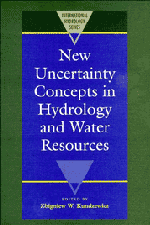Book contents
- Frontmatter
- Contents
- List of Authors
- Preface
- I INTRODUCTION
- II FACETS OF UNCERTAINTY
- III NOVEL APPROACHES TO UNCERTAINTY: FRACTALS, FUZZY SETS AND PATTERN RECOGNITION, NON-PARAMETRIC METHODS
- IV RANDOM FIELDS
- V TIME SERIES AND STOCHASTIC PROCESSES
- 1 Prediction uncertainty in seasonal partial duration series
- 2 A daily streamflow model based on a jump-diffusion process
- 3 The influence of time discretization on inferred stochastic properties of point rainfall
- 4 The distribution of the l-day total precipitation amount
- 5 Analysis of outliers in Norwegian flood data
- 6 Stochastic modelling of the operation of hydrants in an irrigation network
- 7 Order and disorder in hydroclimatological processes
- 8 Towards the physical structure of river flow stochastic process
- VI RISK, RELIABILITY AND RELATED CRITERIA
5 - Analysis of outliers in Norwegian flood data
Published online by Cambridge University Press: 07 May 2010
- Frontmatter
- Contents
- List of Authors
- Preface
- I INTRODUCTION
- II FACETS OF UNCERTAINTY
- III NOVEL APPROACHES TO UNCERTAINTY: FRACTALS, FUZZY SETS AND PATTERN RECOGNITION, NON-PARAMETRIC METHODS
- IV RANDOM FIELDS
- V TIME SERIES AND STOCHASTIC PROCESSES
- 1 Prediction uncertainty in seasonal partial duration series
- 2 A daily streamflow model based on a jump-diffusion process
- 3 The influence of time discretization on inferred stochastic properties of point rainfall
- 4 The distribution of the l-day total precipitation amount
- 5 Analysis of outliers in Norwegian flood data
- 6 Stochastic modelling of the operation of hydrants in an irrigation network
- 7 Order and disorder in hydroclimatological processes
- 8 Towards the physical structure of river flow stochastic process
- VI RISK, RELIABILITY AND RELATED CRITERIA
Summary
ABSTRACT Plausibility analysis of annual maximum flows of Norwegian rivers is performed. The data embrace time series of 60 years (1921–80) gathered at 42 observation stations and time series of 30 years (1921–50 and 1951–80) collected at 86 and 83 observation stations, respectively. Six different tests for outliers detection have been used (Shapiro-Wilk, skewness, Student, RST, probability plot coefficient and Anderson-Darling). The tests are based on the assumption of normal distribution, so the normalization (logarithmic or cube root transformation) of the raw data may be a prerequisite. The empirical orthogonal functions approach was used to simulate regional samples with preserved first and second order moments. Outliers analysis of the simulated data was performed and the results were compared with observations.
INTRODUCTION
The existence of outliers in hydrological observation series can possibly explain many of the problems faced in the regional analysis of hydrological data. Figs. 1 and 2 show some examples of hydrographs and probability plots, containing suspicious outliers conceived as observations strongly deviating from the remainder of the data set.
Processing outliers consists of two stages – detection and treatment. Depending on the way the outliers are treated, one can get quite a different representation of the process. In practice outliers are detected and removed in accordance with some intuitive rule. It is so because one finds it difficult to properly choose the theoretical distribution function for an individual observation series and to estimate its parameters. If the parent distribution was known these problems could have been easily solved.
- Type
- Chapter
- Information
- New Uncertainty Concepts in Hydrology and Water Resources , pp. 245 - 251Publisher: Cambridge University PressPrint publication year: 1995

